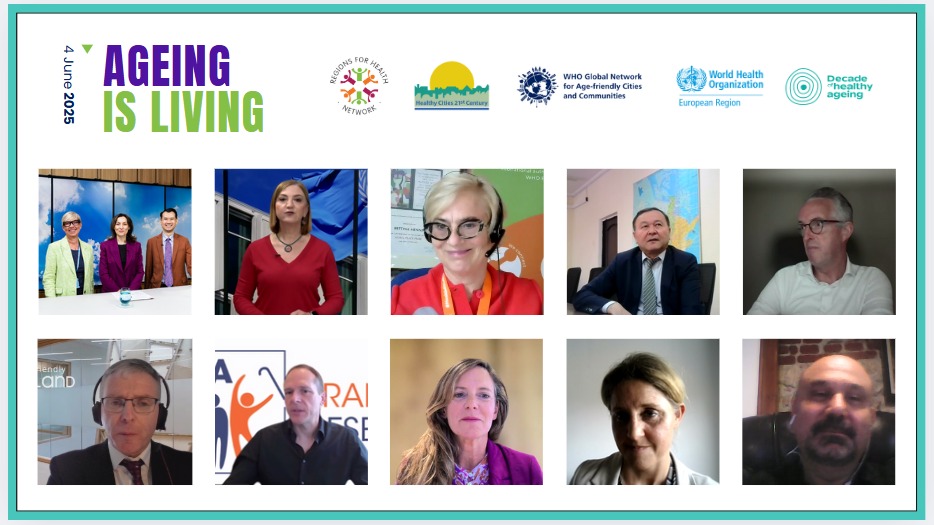Event highlights
Over 220 participants from subnational and local authorities across the WHO European Region joined a dedicated stakeholder engagement to shape the forthcoming WHO European Strategy on Ageing is Living: Promoting a Lifetime of Health and Well-being (2026–2030).

The session was moderated by Yongjie Yon, Technical Officer on Ageing and Health, and Stefania Ilinca, Technical Officer on Long-term Care, from WHO/Europe.
Natasha Azzopardi Muscat, Director of the Division of Country Health Policies and Systems, opened the event by emphasizing the essential role of local leadership: “Local actors are often the closest to communities and the most agile in responding to changing needs – especially for older people who rely on proximity, continuity, and trust.”
She also recognized the power of networks such as the WHO European Healthy Cities Network, the Regions for Health Network, and the WHO Global Network for Age-friendly Cities and Communities in advancing equity and innovation.
Ivan Bautmans of Vrije Universiteit Brussel set the tone with a keynote address urging governments to rethink ageing policies: “Healthy ageing requires a shift from treating disease to investing in environments, systems and services that preserve functional ability and independence.”
A lightning panel moderated by Kira Fortune, Regional Adviser for the WHO European Healthy Cities Network, and Bettina Menne, Senior Policy Adviser on Healthy Settings, featured reflections from local leaders across the Region.
Murat Ar, Urban Planner and Secretary General of the Türkiye National Healthy Cities Network, stressed the importance of embedding health across all aspects of city planning.
Dara McGuigan, Regional Manager (West) of Age Friendly Ireland, shared how municipalities are mainstreaming ageing through policies focused on prevention, participation and universal design.
Ludo Gielis, Policy Officer at the Flanders Department of Care, presented “Caring Neighbourhoods” as a promising model for integrated, community-based care.
Naiara Artaza Aristondo, Head of the Nagusi Intelligence Center, Diputación Foral del Bizkaia (Spain), emphasized, “Transforming ageing into a shared social challenge allows us to plan not just for the next decade, but for a new way of living across generations.”
Nurlybek Assylbekov, Head of the Health Department in Shymkent (Kazakhstan), reflected, “Ageing must be part of how we design and deliver all urban services, from transport to housing to digital access.”
Stefania Pascut, Healthy City Project Coordinator for the Municipality of Udine (Italy), underscored the potential of small cities: “With even modest resources, we can create environments that empower older people to stay active, safe and socially connected.”
In breakout discussions, participants exchanged ideas on strengthening services and systems at the local level. Priorities included investing in integrated, preventive health and social care; adapting public spaces to be more age-friendly; and scaling digital solutions that connect and empower older residents.
Many stressed that inclusive, intersectoral governance and active engagement of older people are essential to making ageing in place a reality, whether in dense urban centres or remote rural communities.
Stefania Ilinca remarked, “Long-term care reform must be grounded in local realities. We need to build systems that not only support independence, but also dignity and choice.”
Yongjie Yon closed the engagement with a call to action: “This Strategy will only succeed if it reflects and responds to the lived experiences of older people in their communities. Local leadership is central to making that vision real.”




